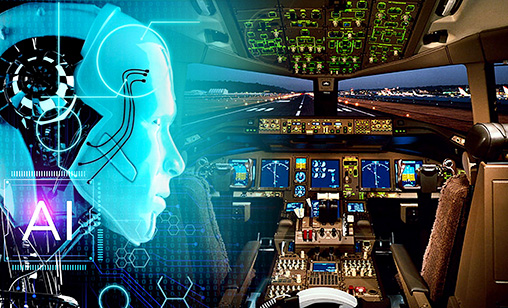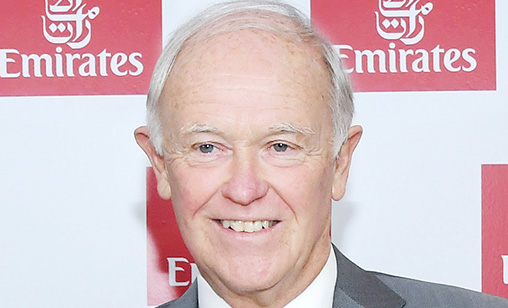Main Story
Artificial Intelligence: no looking back for airlines
Potential risks associated with the accelerating development of Artificial Intelligence (AI) have sparked global debate. Already widely applied in some sectors of the aviation industry a question frequently asked is: should airlines and their industry players more closely analyze where AI is taking aviation? Associate editor and chief correspondent, Tom Ballantyne, reports.
August 1st 2023
Emirates Airline president, Tim Clark, has a message for the industry about Artificial Intelligence (AI). Read More » “A lot of people are concerned about what AI should and should not be doing. But if you are in business and you have something as powerful as this coming along and you are very processes driven and manpower intensive, you have to examine how it could improve what you do,” he said.
In a recent television interview, Clark said AI will have a big impact on the aviation industry. “As the scale and power of artificial intelligence rapidly increases, it is important the aviation sector takes a step back and assesses the difference it could make,” he said.
 |
Clark even believes aircraft operated by a single pilot is a possibility, although it might not necessarily be what passengers want. “Passengers like to think there are two pilots up there. There will always be somebody on the flight deck in my view,” he said.
He is correct on both counts. It will be a long time before air travellers will be prepared to board an airplane flown by only one human and a robot. But AI does have the potential to revolutionize business practices across the aviation spectrum and save airlines millions of dollars.
At present, AI is mainly being applied to MRO operations, management and revenue optimization and customer service and engagement. It also can be incorporated into fleet optimization, flight planning and ground operations strategies. Aircraft designers can use AI tools to facilitate and speed up the design and certification of products before they hit the market.
Aircraft manufacturers also are increasingly turning to AI, believing it will inject huge efficiencies into their operations. For example, Boeing’s chief information officer, Susan Doniz, said the aerospace company has a T7 fighter trainer aircraft it designed all the way to first flight in 36 months.
“That is unheard of in this industry,” she said. “The reason we were able to do so was because of digital and data tools. I think, in five years we will be able to build as well as fly an aircraft a thousand times before we actually physically build it. We will be able to do that much more quickly, much more reliably and much more sustainably.”
There is evidence many industry sectors are pumping more money into the adoption of AI. Global cloud enterprise software company, IFS, has reported its annual revenue soared 55% year-on-year in the six months to June 30, mainly because of demand for its AI capabilities. Despite high inflation and monetary policy tightening, companies are continuing to invest in AI, the consultancy said.
In the last 12 months, IFS has written several high profile deals and partnership agreements with airlines and transport companies. Customers include China Airlines and Emirates Airline.
 |
AI in aviation is forecast to have great impact where it can reduce human workload or increase human capabilities in complex scenarios. They include supporting air traffic controllers, pilots, airport operators, flow controllers and cyber security officers in their jobs.
AI, it also is predicted, will increase safety and cyber resilience with the provision of new conflict detection, traffic advisory and resolution tools. It will enable better use of aviation data, leading to more accurate predictions and more sophisticated tools, increased productivity and enhanced use of scarce resources such as congested airspace and runways.
But there also are concerns. One potential fear is AI is developing so rapidly it could become uncontrollable and that machines could eventually out-think humans and make their own decisions.
In May this year, the European Union Aviation Safety Agency (EASA) released its new AI Road Map 2.0, intended to “advance the human-centric approach to integrating artificial intelligence in aviation”.
The updated document incorporates progress achieved in the field since the publication of the air safety agency’s first road map in February 2020.
According to EASA, the new road map “provides a comprehensive plan for the safe and trustworthy integration of AI in aviation, with a focus on safety, security, AI assurance, human factors and ethical considerations”. It is part of the agency’s efforts to promote the safe integration of new and emerging technologies in aviation.
Another major concern about AI is that its increasing application will lead to significant job losses in aviation. Already, robots have taken over some tasks that humans previously performed in the aerospace industry, some analysts point out. An example is that new autonomous airplanes will reduce demand for commercial pilots.
High technology company executives said this will not necessarily be the case. GridRaster founder and chief executive, Rishi Ranjan, said AI has the potential to create jobs that did not exist before AI.
 |
Potentially, they could be maintaining AI systems for both aircraft and ground operations, developing algorithms and ensuring AI is used ethically and responsibly. GridRaster takes to market next generation mobile and network based products.
Aircraft manufacturers and technicians do not need to worry about robots taking their jobs, Ranjan said. Rather, AI will change the way the work is done. “The human in the loop always will be there because AI, while good at pattern recognition and making predictions, will never improve on human perception,” he said.
“If you want the best efficiency in aerospace, because of the high (amount of) intellectual property and very large knowledge base that is needed to operate in these fields, it always will be a complementary relationship between machines and human staff.”
Customer service is one area of airline operations where AI already is being used extensively. Many booking services are completely automated. Travellers engage with human-like chatbots, plan their trips and book their tickets completely by themselves. The data gathered from potential and previous customers is used to understand their purchase behavior and recommend tailored services.
Overall, aviation industry leaders, whether they be from airlines, airports, air traffic management or original equipment manufacturers), are optimistic AI will bring huge benefits to their businesses.
Boeing’s Doniz said AI will introduce predictability into a very unpredictable sector. “You can use these tools to help predict the future but also the recovery. It is an industry full of anxiety in a very anxious society right now,” she said. “Bringing in these tools will help everybody have a less anxious trip. It will bring so many benefits to customers, passengers, crew and to our planet.”
megan moroney says:
January 27th 2024 12:23pm